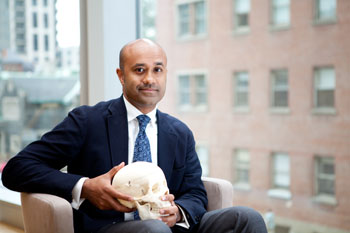Research examines role of signaling pathways in cancers like glioblastoma

By Ana Gajic

Dr. Sunit Das
New research published recently in Scientific Reports may shed new light on controlling the development of glioma cells, which are tumours found in cancers such as glioblastoma.
Research led by Toronto’s St. Michael’s Hospital and The Hospital for Sick Children (SickKids) suggests that the growth and reproduction of glioma cells, found in glioblastoma and other cancers of the brain and spine, is promoted through a signal called Transforming growth factor beta (TGF-beta). TGF-beta controls proliferation and other functions in most cells. The researchers found that a series of molecular signals initiated by Bone Morphogenetic Protein (BMP), on the other hand, inhibits the production of these cells.
Glioblastoma is an aggressive form of brain cancer, representing 15 per cent of all primary brain tumours, and is often difficult to treat. Therapy generally involves the combination of several approaches to control the disease, but there is currently no cure. The diagnoses of the late Tragically Hip singer Gord Downie and U.S. Sen. John McCain have raised the profile of glioblastoma in recent years.
“TGF-beta and BMP signals changed in response to stressors on the tumour,” said Dr. Sunit Das, a scientist at St. Michael’s Keenan Research Centre for Biomedical Science and associate scientist at The Arthur and Sonia Labatt Brain Tumour Research Centre at SickKids.
“Factors such as surgery, chemotherapy and radiation impacted the signaling within the tumour and constitute part of the survival response of tumour cells.”
This research builds on earlier work from Dr. Das’ lab that found that the protein ID1 is critical to tumour initiation and growth in glioblastoma and also impacts the disease’s response to chemotherapy.
“This study suggests that TGF-beta and BMP signaling could be modified to improve tumour control,” said Dr. Das, who is also a neurosurgeon at St. Michael’s.
“This work takes us one step closer to developing novel treatments for patients with brain and spinal cancer, for whom we unfortunately often do not have too many treatment options.”
The next steps, he said, will be to identify agents that could help modify these key signals.
This story is one of many we’re highlighting to share discoveries led by our Keenan Research Centre for Biomedical Science. The Keenan is home to basic science and translational research at Unity Health. Our researchers target common and high burden illnesses that are important to patients and strive to make discoveries that will improve patients’ lives. The Keenan: Driven by discovery. Share our stories using #TheKeenanDiscovery.
About St. Michael’s Hospital
St. Michael’s Hospital provides compassionate care to all who enter its doors. The hospital also provides outstanding medical education to future health care professionals in more than 27 academic disciplines. Critical care and trauma, heart disease, neurosurgery, diabetes, cancer care, care of the homeless and global health are among the Hospital’s recognized areas of expertise. Through the Keenan Research Centre and the Li Ka Shing International Healthcare Education Centre, which make up the Li Ka Shing Knowledge Institute, research and education at St. Michael’s Hospital are recognized and make an impact around the world. Founded in 1892, the hospital is fully affiliated with the University of Toronto.
About Unity Health Toronto
Unity Health Toronto, comprised of Providence Healthcare, St. Joseph’s Health Centre and St. Michael’s Hospital, works to advance the health of everyone in our urban communities and beyond. Our health network serves patients, residents and clients across the full spectrum of care, spanning primary care, secondary community care, tertiary and quaternary care services to post-acute through rehabilitation, palliative care and long-term care, while investing in world-class research and education. For more information, visit www.unityhealth.to.
